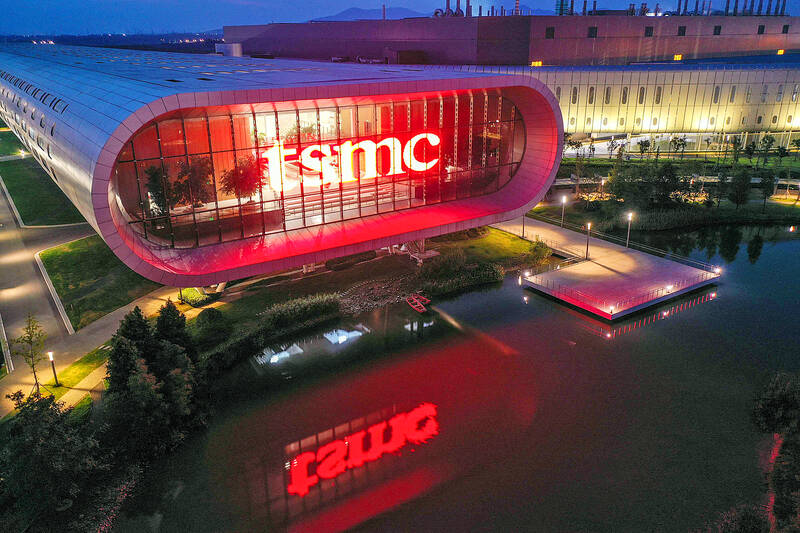Resonac Holdings Corp is ready to spend hundreds of billions of yen on chip acquisitions, as the 84-year-old chemicals giant seeks to boost its role as a pivotal supplier to global giants such as Taiwan Semiconductor Manufacturing Co (TSMC, 台積電) and Samsung Electronics Co.
The Japanese company, which last year outlined a ¥250 billion (US$1.94 billion) blueprint to enhance its chip facilities by 2027, aims to capitalize on a much-needed consolidation of the US$580 billion semiconductor industry, CEO Hidehito Takahashi said.
Resonac, which changed its name from Showa Denko to reflect its changing focus, must find partners to thrive in an increasingly politicized and economically uncertain environment, he said.

Photo: AFP
Takahashi said there are not many attractive acquisition targets right now as the industry is in a state of flux, but Resonac is looking to invest, and one promising country is the US, as its major customers, from Samsung to TSMC, spend billions to build plants there.
The Japanese company remains cautious about spending in China, given Washington’s escalating campaign to curb that country’s semiconductor industry, he said.
“I’m always on the lookout for potential acquisition chances, and I wouldn’t hesitate to spend a hundred billion yen if it merits restructuring our business portfolio,” the 61-year-old executive said.
“When a deal is justified, I will go ahead and throw hundreds of billions of yen at it as there are many financial tools for us to leverage,” he said. “The problem is that no one wants to sell businesses that are growing.”
Demand for chips cratered last year after consumers and businesses turned cautious about spending on everything from servers to smartphones. Washington’s effort to curb Beijing’s ambitions in semiconductors, as well as uncertainty about a potential global recession, have clouded the sector’s prospects.
“Everyone in the industry feels uneasy going it alone,” Takahashi said. “I have no doubt consolidation is ahead for the industry, and the key is forming as many alliances as possible.”
Some could evolve into acquisition talks, he added.
Growing through acquisitions is part of Resonac’s well-established playbook.
Takahashi, a former General Electric Co executive, led one of the Japanese company’s most transformative deals. Resonac paid more than double its market value for the chemicals unit of Hitachi Ltd in 2020, a US$8.8 billion deal that made it a major supplier of a key compound used to polish the surface of silicon wafers.
Resonac leads the market in key semiconductor packaging materials such as copper-clad laminates and photosensitive film, and it aims to increase the proportion of revenue from chip materials to 45 percent of overall sales by 2030 from 31 percent in 2021.
The company is researching next-generation 3D packaging technology, anticipating a potential industry shift that could drive its next phase of growth.

Taiwan Semiconductor Manufacturing Co (TSMC, 台積電) would not produce its most advanced technologies in the US next year, Minister of Economic Affairs J.W. Kuo (郭智輝) said yesterday. Kuo made the comment during an appearance at the legislature, hours after the chipmaker announced that it would invest an additional US$100 billion to expand its manufacturing operations in the US. Asked by Taiwan People’s Party Legislator-at-large Chang Chi-kai (張啟楷) if TSMC would allow its most advanced technologies, the yet-to-be-released 2-nanometer and 1.6-nanometer processes, to go to the US in the near term, Kuo denied it. TSMC recently opened its first US factory, which produces 4-nanometer

GREAT SUCCESS: Republican Senator Todd Young expressed surprise at Trump’s comments and said he expects the administration to keep the program running US lawmakers who helped secure billions of dollars in subsidies for domestic semiconductor manufacturing rejected US President Donald Trump’s call to revoke the 2022 CHIPS and Science Act, signaling that any repeal effort in the US Congress would fall short. US Senate Minority Leader Chuck Schumer, who negotiated the law, on Wednesday said that Trump’s demand would fail, while a top Republican proponent, US Senator Todd Young, expressed surprise at the president’s comments and said he expects the administration to keep the program running. The CHIPS Act is “essential for America leading the world in tech, leading the world in AI [artificial

REACTIONS: While most analysts were positive about TSMC’s investment, one said the US expansion could disrupt the company’s supply-demand balance Taiwan Semiconductor Manufacturing Co’s (TSMC, 台積電) new US$100 billion investment in the US would exert a positive effect on the chipmaker’s revenue in the medium term on the back of booming artificial intelligence (AI) chip demand from US chip designers, an International Data Corp (IDC) analyst said yesterday. “This is good for TSMC in terms of business expansion, as its major clients for advanced chips are US chip designers,” IDC senior semiconductor research manager Galen Zeng (曾冠瑋) said by telephone yesterday. “Besides, those US companies all consider supply chain resilience a business imperative,” Zeng said. That meant local supply would

Servers that might contain artificial intelligence (AI)-powering Nvidia Corp chips shipped from the US to Singapore ended up in Malaysia, but their actual final destination remains a mystery, Singaporean Minister for Home Affairs and Law K Shanmugam said yesterday. The US is cracking down on exports of advanced semiconductors to China, seeking to retain a competitive edge over the technology. However, Bloomberg News reported in late January that US officials were probing whether Chinese AI firm DeepSeek (深度求索) bought advanced Nvidia semiconductors through third parties in Singapore, skirting Washington’s restrictions. Shanmugam said the route of the chips emerged in the course of an